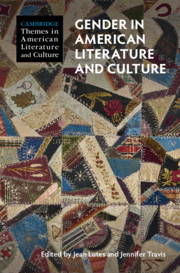Book contents
- Gender in American Literature and Culture
- Cambridge Themes in American Literature and Culture
- Gender in American Literature and Culture
- Copyright page
- Contents
- Contributors
- Acknowledgments
- Introduction
- Part I Intimacies
- Chapter 1 The Price of Freedom
- Chapter 2 Post-Reproductive Female Sexuality and the Early American Novel
- Chapter 3 The Effeminate Man in Nineteenth-Century America
- Chapter 4 Rereading Puritan Masculinity through Trans Theory
- Chapter 5 “Unbounded Grief”
- Chapter 6 Rethinking Reproductive Freedom through Transpacific Narratives
- Chapter 7 Slow Emergency
- Part II Aggressions
- Part III New Directions
- Bibliography
- Index
Chapter 5 - “Unbounded Grief”
Black Maternal Sorrow and the Literature of Slavery
from Part I - Intimacies
Published online by Cambridge University Press: 01 April 2021
- Gender in American Literature and Culture
- Cambridge Themes in American Literature and Culture
- Gender in American Literature and Culture
- Copyright page
- Contents
- Contributors
- Acknowledgments
- Introduction
- Part I Intimacies
- Chapter 1 The Price of Freedom
- Chapter 2 Post-Reproductive Female Sexuality and the Early American Novel
- Chapter 3 The Effeminate Man in Nineteenth-Century America
- Chapter 4 Rereading Puritan Masculinity through Trans Theory
- Chapter 5 “Unbounded Grief”
- Chapter 6 Rethinking Reproductive Freedom through Transpacific Narratives
- Chapter 7 Slow Emergency
- Part II Aggressions
- Part III New Directions
- Bibliography
- Index
Summary
The image of the grieving black mother continues to haunt the American cultural imaginary. Black women’s loss and public grief are often expected to awaken the nation’s conscience; but at what cost to black women? In performing this emotional labor for their communities and nation, black women’s own pain often goes unheard, unacknowledged, and unattended. I propose an engaged and ethical reading practice that “handles warmly” the grief of black mothers. Returning to the wound of slavery, uncovering its psychic injuries, and attending to its emotional complexities in the literature of slavery, I argue that by simply grieving, refusing to be comforted, and refusing to tame their tears and shrieks for the comfort and peace of their tormentors, slave mothers privileged the integrity and validity of their emotions, an act that both resisted the disciplining of black emotions and enacted a radical ethic of self-care.
- Type
- Chapter
- Information
- Gender in American Literature and Culture , pp. 82 - 95Publisher: Cambridge University PressPrint publication year: 2021

